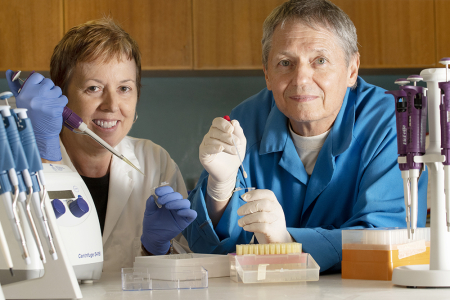Charles Darwin University researchers will delve into the skin microbiome of frogs and geckos to better understand how animals and their microbes maintain health and possibly resist disease.
The Research Institute for the Environment and Livelihoods (RIEL) team of Professor Keith Christian, Professor Karen Gibb and Dr Mirjam Kaestli secured an Australian Government Discovery grant valued at $450,000 for their research project "Skin microbes and animal health: Understanding the ecological context".
Professor Christian said the project aimed to shed light on the ecological relationships between animal hosts and the bacteria in their skin, to provide insight into how they protect against disease.
"The microbiome found of the surface of skin is made up of a community of microbes to provide protection against disease and infection," Professor Christian said.
"Using DNA and RNA sequencing techniques, this research will help us understand how skin microbes function as a community in their own right, and in supporting the health of their animal hosts."
He said the research would provide significant benefits, including more targeted conservation efforts to combat wildlife skin diseases.
"Preserving wild Australia is undeniably important and waiting for mass deaths is too late," he said. "The costs can be severe, not only in terms of environmental sustainability, but also in economic terms; nature underpins tourism, education and community cohesion.
"This project will lay the foundation needed to develop much needed new tools for early warning indication of changes in wildlife health."
CDU microbiologist and RIEL Co-Director Professor Karen Gibb said the team would use DNA sequencing techniques to identify important skin microbes on frogs, geckos and cane toads across Northern Australia to find out what role the skin microbiome may play in infection resistance.
"Finding out how these key microbes function to support animal health will require us to use the latest techniques in DNA and RNA technology. For example, determining which microbes are actively responding to parasite challenges may require us to measure which genes are switched on and for that we need to measure the microbe's RNA," she said.
Professor Christian said that the study would also assist in the monitoring the health of animals in the future.
"This will help guide future research efforts on the factors that determine a healthy skin microbial community - which is needed before skin diseases can be combated," he said.
"This research could eventually be applied to other species of cultural or economic importance."







